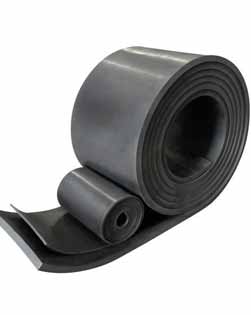Butadiene rubber is supposed to be the most elastic rubber type. The chemical name of this rubber is Polybutadiene. This rubber is polymerized butadiene and usually used in combination with other rubber types. This rubber is the second largest volume synthetic rubber produced, after styrene-butadiene rubber (SBR). In 1999, the consumption was about 1,953,000 metric tons worldwide.
Application of Butadiene Rubber
A typical application is a blend of BR and natural rubber in truck tires. The major use of butadiene rubber is in tires with over 70% of the polymer produced going into sidewalls and treads. This rubber is usually combined with other elastomers like natural rubber or SBR for tread compounds. It also has a major application as an impact modifier for acrylonitrile-butadiene-styrene resin (ABS) and polystyrene with about 25% of the total volume going into these applications. Typically about 7% of this rubber is added to the polymerization process to make these rubber-toughened resins. Due to its outstanding resiliency, it is estimated that about 20,000 metric tons worldwide of “high cis” polybutadiene is used every year in golf ball cores. This application is widely growing because the golf ball industry seems to be moving away from the traditional wound ball technology to the two-piece, solid core construction, made of BR, in combination with other rubbers.


Properties of Butadiene Rubber
- High Elasticity
- Low temperature properties
- Wear resistance
- Low hysterisis
- Good flexibility at ambient temperatures
- High abrasion resistance in severe conditions
- Low rolling resistance
The butadiene rubber is and will continue to be a high volume rubber for use in toughened plastics, tires, and golf balls due to its low cost, availability and unique properties.
Other Types of Synthetic Rubber
- Anti Vibration Mountings
- Automobile Rubber Products
- Calendered Rubber Products
- Extruded Rubber Products
- Medical Rubber Products
- Metal Bonded Components
- Rubber Adhesives & Sealants
- Rubber Ball
- Rubber Bands
- Rubber Beading
- Rubber Bearing
- Rubber Belt
- Rubber Buckets
- Rubber Bullets
- Rubber Cable
- Rubber Coating
- Rubber Duct
- Rubber Expansion Joints
- Rubber Flooring/Matting
- Rubber Footwear
- Rubber Gloves
- Rubber Injection Parts
- Rubber Lining
- Rubber Magnets
- Rubber Molded Products
- Rubber Pads
- Rubber Rollers
- Rubber Stopper
- Rubber Suit
- Rubber Track
- Rubber Valve
- Rubber Balloon
- Rubber Stamps
- Rubber Fenders
- Acrylic Rubber (ACM)
- Butadiene Rubber (BR)
- Butyl Rubber (IIR)
- Chlorosulfonated Polyethylene(CSM)/ Hypalon
- Ethylene Propylene Diene Monomer
- Fluoroelastomers (FKM)/Viton
- Isoprene Rubber (IR)
- Nitrile Rubber (NBR)
- Perfluoroelastomer (FFKM)
- Polychloroprene (CR)/Neoprene
- Polysulfide Rubber (PSR)
- Silicone Rubber (SiR)
- Styrene Butadiene Rubber
How to Make a Custom Rubber Stamp?
Whenever designing a custom stamp for your company, never compromise on its quality because in the end it is the most...
Read MoreLatex and Silicone Rubber Tubing - A Comparison!
Many industries use rubber tubing for various purposes. In fact, various types of rubber tubing are used for different applications...
Read MoreSilicone vs Acrylic Adhesive- A Comparison
Silicon and acrylic adhesives are those rubber adhesives that are widely used in Polyimide tapes. In fact, the polyimide...
Read More

